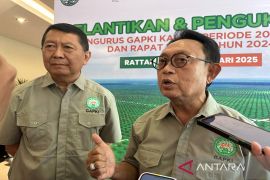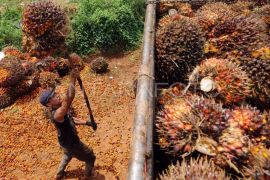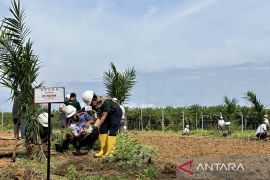Bali (ANTARA) - The Indonesian Palm Oil Association (GAPKI) underlined the need to take strategic steps to maintain competitiveness of the country's palm oil industry by strengthening sustainable palm oil production.
"We hope that the Indonesian government can take wise steps to maintain the competitiveness of the palm oil industry by strengthening sustainable palm oil production," GAPKI Chairman Eddy Martono stated at the 19th Indonesia Palm Oil Conference and 2024 Price Outlook (IPOC) here, Thursday.
According to Martono, the domestic palm oil industry's performance in 2023 would not be better than the previous year, including in terms of the prices.
However, the commodity is expected to show a bullish trend in 2024 due to several factors, such as the El Nino phenomenon this year that will affect production.
On the other hand, he remarked that Indonesia, as the largest producer of palm oil, has experienced production stagnation in recent years due to slow replanting by farmers.
Indonesia's CPO production in 2023 is expected to rise by around one million tons from last year's 46.7 million tons, according to the association.
However, production is expected to decline in 2024, with the extent determined by the intensity of the El Nino weather pattern.
Meanwhile, the government will continue to develop B35, which is a mixture of palm oil-based biodiesel and diesel fuel.
This, coupled with increased domestic consumption for food and industry, will lower Indonesia's palm oil supply.
"In the last few months, we have also seen a decline in global palm oil prices, which was triggered by weakening purchasing power due to the economic slowdown in various countries and abundant stocks in producing countries," he remarked.
Related news: Palm oil industry contributes US$5.29 bln in forex: Gapki
Martono noted that market uncertainty has grown wider with the threat of food and energy crises as well as trade barriers from importing countries, one of which is the European Union Deforestation-free Regulation (EUDR).
Martono said, the palm oil industry is the largest foreign exchange contributor for Indonesia even during the COVID-19 pandemic.
"As of August 2023, production reached 36.3 million tons with biodiesel and oleochemical exports of more than 23.4 million tons. This has contributed around US$20.6 billion to the country's foreign exchange," he remarked.
According to Martono, with the right government policies, the palm oil industry could grow well amid the current market and economic dynamics.
Meanwhile, Coordinating Minister for Economic Affairs Airlangga Hartarto stated that EUDR is a European Union policy that regulates commodities and their impact on deforestation. The regulation covers soybeans, wood, beef, cocoa, rubber, coffee, and palm oil.
"Despite our concerns, the government is ready to collaborate with the European Union in building a framework that promotes sustainable agriculture, including vegetable oil production, in an inclusive, holistic, fair, and non-discriminatory way," he remarked.
He also noted that through the Indonesian Sustainable Palm Oil Plantation Certification System (ISPO), Indonesia is encouraging the development of sustainable palm oil.
He stated that the ISPO certification guarantees that production practices carried out by palm oil companies and farmers follow the principles and rules of sustainability.
Related news: Palm oil industry will remain crucial national economic backbone: VP
Related news: CPOPC urges youth to help build sustainable palm oil industry









